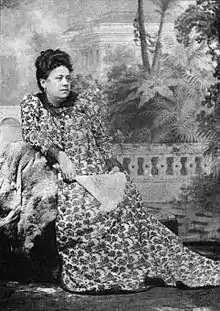Kaulana Nā Pua
"Kaulana Nā Pua" ("Famous are the flowers") is a Hawaiian patriotic song written by Eleanor Kekoaohiwaikalani Wright Prendergast (April 12, 1865 – December 5, 1902) in 1893 for members of the Royal Hawaiian Band who protested the overthrow of Queen Liliʻuokalani and the Hawaiian Kingdom. The song is also known under the title of Mele ʻAi Pōhaku, the "Stone-Eating Song", or Mele Aloha ʻĀina, the "Patriot's Song". It is still popular in Hawaiʻi today, although it is not clear how many non-Hawaiian speaking listeners are aware of the song's historical significance or the profound antipathy to U.S. annexation in its lyrics.

According to Elbert and Mahoe (1970), "The song was considered sacred and not for dancing." However, today hālau hula perform Kaulana Nā Pua as a hula ʻauana for makuahine (a graceful dance for mature women).
The Hawaiian lyrics, with one English translation of them, are:
Kaulana nā pua aʻo Hawaiʻi
Kūpaʻa mahope o ka ʻāina
Hiki mai ka ʻelele o ka loko ʻino
Palapala ʻānunu me ka pākahaFamous are the children of Hawaiʻi
Ever loyal to the land
When the evil-hearted messenger comes
With his greedy document of extortionPane mai Hawaiʻi moku o Keawe
Kōkua nā Hono aʻo Piʻilani
Kākoʻo mai Kauaʻi o Mano
Paʻapū me ke one KākuhihewaHawaiʻi, land of Keawe answers
The bays of Piʻilani help
Kauaʻi of Mano lends support
All are united by the sands of KākuhihewaʻAʻole aʻe kau i ka pūlima
Maluna o ka pepa o ka ʻenemi
Hoʻohui ʻāina kūʻai hewa
I ka pono sivila aʻo ke kanakaDo not fix a signature
To the paper of the enemy
With its sin of annexation
And sale of the civil rights of the peopleʻAʻole mākou aʻe minamina
I ka puʻukālā a ke aupuni
Ua lawa mākou i ka pōhaku
I ka ʻai kamahaʻo o ka ʻāinaWe do not value
The government's hills of money
We are satisfied with the rocks
The wondrous food of the landMahope mākou o Liliʻulani
A loaʻa e ka pono o ka ʻāina
[alternate stanza:
A kau hou ʻia e ke kalaunu]
Haʻina ʻia mai ana ka puana
Ka poʻe i aloha i ka ʻāinaWe support Liliʻuokalani
Who has won the rights of the land
[alternate stanza:
She will be crowned again]
The story is told
Of the people who love the land
The "government" referred to in the song is the Provisional Government of Hawaii (which was later to become the Republic of Hawaii and subsequently the territory and state), proclaimed by the conspirators upon seizing power. Mrs. Prendergast composed the song for the Royal Hawaiian Band, who:
- … had just walked out on their jobs after the bandmaster demanded they sign an oath of loyalty to the Provisional Government… . The bandmaster said they had better sign or they would be eating rocks. It is obvious that they meant it was not right to sell one's country or loyalty to one's country for money. If we hold on to the land, the land will always feed us. … [L]and endures.
- —Noenoe Silva, assistant professor in political science, University of Hawaiʻi at Mānoa, in Honolulu Weekly
The Hawaiian Renaissance has lent the song Kaulana Nā Pua renewed significance in recent years. Its words are often cited in the context of the Hawaiian sovereignty movement as an expression of opposition to U.S. rule.
References
- Elbert, Samuel H. and Noelani Mahoe, "Nā Mele o Hawaiʻi Nei, 101 Hawaiian Songs", University of Hawaii Press, Honolulu, 1970, ISBN 0-87022-219-8
- Nordyke, Eleanor C.; Noyes, Martha H. (1993). "Kaulana Na Pua: A Voice for Sovereignty". The Hawaiian Journal of History. Honolulu: Hawaiian Historical Society. 27: 27–42. hdl:10524/172. OCLC 60626541.
- Liliuokalani, "Hawaii's Story by Hawaii's Queen", Charles E. Tuttle Company, Inc., Tokyo, Japan, 1964